- Home
- Jason Starr
The Craving Page 11
The Craving Read online
Page 11
While the events of that night seemed foggy and fragmented, like a dream almost forgotten, Simon remembered exactly what transforming had felt like. It was a rush of confidence and strength, and, though it was extremely painful, the sudden release of human worries and fears was relaxing, even blissful. Now in his nonwolf state he was strong—much stronger than he used to be—but it was nothing compared to how powerful he felt as a full-blown werewolf. When he was a werewolf he was in total control. Nothing, absolutely nothing, could defeat him and he felt like … well, like he was invincible.
Simon doubted he was actually immortal. For example, if someone tore his jaw apart he knew he wouldn’t survive, and if he were in a fiery plane crash or at the epicenter of a nuclear explosion he probably wouldn’t walk away unscathed. But last night a cab had slammed into him at about forty miles per hour and he’d gotten up as if he’d slipped in the street in the snow, so there was no doubt he had some superhuman ability to heal from injuries and absorb trauma. This raised the question, if the cab hadn’t killed him, what would? Would a bullet to the heart or the brain do the job, or if he was shot would he miraculously heal? Or what if someone stabbed him with a knife and severed a major artery? Would his arteries heal immediately? And what about dying of natural causes? If he got cancer, would he somehow be able to fight it off?
When Simon was growing up, he was obsessed with superheroes. He devoured as many comic books as he could and sometimes imagined he was a superhero himself and had to save the world from imminent destruction. After he became an adult the obsession had waned but the fascination hadn’t, and over the years he’d occasionally sneak out to his favorite comic book shop on his lunch break and read the latest releases. Now, as he sat at the edge of the bed tying his shoelaces, he thought, Could I be a superhero? Last month, seriously asking himself this question would have been the sign of a major mental illness, but now it didn’t seem ridiculous at all. He could run extremely fast, seemed to have limitless endurance, and had survived an accident that would have killed anyone else; if those weren’t prerequisites for superherodom, what were? Maybe he’d been looking at this all wrong, being so concerned about his potential for hurting people. What if he put his strength to good use and helped people? He could fight crime, save lives, or—hell, why not?—he could become a secret weapon for the U.S. Army—move over Captain America, here comes Simon Burns. Seriously, what did any Navy SEAL have on him?
“Are you coming?”
Alison’s voice snapped Simon out of his fantasy.
“Yeah,” Simon said, probably smiling widely. “Let’s motor.”
Alison seemed confused, as if she didn’t recognize him. Then she said, “You seem so happy today.”
“I guess I am happy,” Simon said. “Is that a bad thing?”
Alison still looked like she couldn’t figure Simon out. Then she said, “No, happiness is definitely not a bad thing.”
Alison put Jeremy in his stroller, and then they headed out for a family day. Spending some quality time as a family had been Simon’s suggestion, because he’d realized that since he’d lost his job and become a full-time stay-at-home, he and Alison had been doing a lot of tag-team parenting, which probably had been having as detrimental an effect on their marriage as anything else. After all, how could they get closer if they were always apart?
One of their typical family outings was to hang out at the South Street Seaport and then have lunch in Chinatown, so they’d decided that was where they’d head today.
Leaving the building, Alison, pushing the stroller ahead of her, turned left. Simon knew she was heading toward the subway at Eighty-sixth and Broadway because that was how they usually traveled downtown. But since he’d become a werewolf, there was nothing he hated more than the dank subways.
“Um, how about a cab?” Simon asked.
Alison stopped and said, “A cab? Why?”
“Um, I don’t know,” Simon said. “I just think it would be nicer, that’s all.” Actually he wanted to run downtown, but he knew that suggestion wouldn’t go over very well.
“What’s nice about a cab?” Alison asked. “Besides, we said we’re cutting back on cabs, remember?”
It was true that they’d crunched the numbers and figured out that, despite Simon’s unemployment payments, the only way they could get by in Manhattan on one salary was if they cut down on unnecessary expenses, such as taking taxis.
“Then how about a bus?” Simon suggested.
“It’ll take forever to go downtown on a bus,” Alison said.
“Come on, it’ll be better,” Simon said. “Besides, the 1 train is always packed on weekends. It’ll be a pain with the stroller.”
“If you really want to take a bus, let’s take a bus,” she said.
She was right—the trip downtown did take forever. Well, more than an hour anyway. But Alison didn’t seem at all annoyed and Jeremy was having a great time, getting attention from both parents at once for a change. They sang songs and told silly knock-knock jokes and it was great, just like old times.
When they got off the bus, Jeremy seemed tired and after a snack of Goldfish crackers and a little box of apple juice he got silent, the way he did when he was ready to take a nap. Sure enough, a few minutes later he was out cold.
Jeremy’s naps usually lasted about an hour and a half, which would give Simon and Alison a good chunk of time to themselves. Having one-on-one time felt awkward, but it was also exciting, like a first date. They had to come up with topics for conversation and figure out how to talk to each other again. Alison told him about what had been going on with her work, how her firm was going to start test-marketing a new product, and how she would have to go for a couple of days of training in a few weeks. Simon shared some anecdotes about Jeremy and his latest learning leap—the other day he’d used the phrase May I suggest for the first time—and they marveled about how fast he was growing up and how time was flying by.
“I have to apologize to you,” Alison said. “I shoudn’t’ve tried to arrange that play date for you with Stacy Rosenberg.”
“It’s okay,” Simon said.
“No, it isn’t okay,” she said. “I’ve just been under a lot of stress myself, with work and everything, and I shouldn’t’ve undermined you. You’re the stay-at-home dad.”
Simon got the sense she wasn’t speaking her own words, that she’d sought advice from a friend, or a book on marital problems, or even a psychologist. Still, Simon appreciated that she was trying to make up.
“Thanks,” Simon said, “but you’re right, Jeremy should be having more play dates and there’s no reason why we can’t meet up with your friend just to see how it goes. I know their daughter’s younger, but who knows? Maybe they’ll hit it off.”
Alison smiled and said, “This feels good.”
“What does?” Simon asked.
“Resolving conflict so easily,” she said. “We waste so much time bickering. I mean, there’s no reason to be at each other’s throats.”
Thinking that being at her throat was exactly what he was so afraid of, he said, “Yeah, that’s definitely something we should try to avoid.”
Walking up Water Street, he held her hand, feeling a twinge of arousal, but it was okay—he was confident he could control it.
“Oh, I meant to tell you,” Alison said. “Did you hear about what happened at the zoo yesterday?”
Ignoring a flash of the polar bear pounding against the Plexiglas, Simon played dumb. “No, what happened?”
“It was on the local news this morning,” Alison said, “you know, one of those morning shows. Yesterday afternoon Gus the polar bear apparently went crazy.”
Alison described what had been reported, and Simon did a good job of acting like he was hearing it all for the first time.
“Wow,” he said, “that’s pretty intense.”
“I was wondering if you guys were there when it happened,” Alison said. “I mean they said it happened a little after noon. That’s
around when you were there, wasn’t it?”
“Um, around then,” Simon said. “I guess we must’ve just missed it.”
“Yeah, you must’ve,” Alison said.
Was Simon imagining it or did she seem a bit suspicious?
“We should probably get a snack for Jeremy, he’ll be hungry when he gets up,” he said, just to change the subject.
As they turned off Water Street onto the closed-off cobblestoned mall area of the Seaport, passing bars, restaurants, and touristy shops, Simon was suddenly aware of the strong odor of urine. Some reveler last night must’ve taken a leak—Simon was able to pinpoint the location—against the brick wall of a building to his right. He knew it was human urine, not animal urine. He could tell the difference—human urine smelled more like, well, more like his own urine. His ability to detect smells was another power that he could put to good use. What if he could be trained to sniff out bombs? He bet his ability to discern odors was as powerful as any police dog. He could save thousands of people and thwart a terrorist attack, maybe save the whole city.
Simon was aware that Alison had asked him a question, but he had no idea what the question was.
“Sorry, what was that?”
“I said doesn’t it freak you out?”
Simon was lost for a few seconds, then caught on that she was still talking about the zoo. Trying to ignore another flash of the furious bear, he said, “Doesn’t what freak me out?”
“You know.” She was looking at him in a knowing way. Did she know? Was she just trying to get him to open up and tell her the truth? She added, “Polar bears don’t usually lose it like that. And you know what always happens in disaster movies. It’s always the animals who sense the danger first.”
“So is that what you really think?” Simon said. “That there’s going to be some big disaster?”
He was just relieved to be having a conversation that didn’t contain the word werewolf.
“I don’t know,” she said. “But if there’s a tsunami tonight, don’t say I didn’t warn you.”
They smiled together. It felt good to be joking around and enjoying each other’s company.
They wove through the crowd of mainly tourists and teenagers, toward the mall, which was on a pier stretching into the East River. For years, since well before Jeremy was born, they’d been coming down here, usually on warm summer nights, to have drinks overlooking the water.
“Want to go to our old spot?” Alison asked.
“I’d love that,” Simon said.
Because Jeremy was still asleep in the stroller, they couldn’t take the escalator, and Alison suggested the elevator.
Elevators weren’t nearly as bad as the subway, but Simon had been trying to avoid them as much as possible; still, he didn’t want to put up a stink about it. So they got on, with several other people, and though the aromas of deodorants and perfumes and bodily scents were overwhelming, Simon managed to get through it. He was so much better than he’d been just a couple of days ago. There was no doubt he was getting used to sensory overload.
They went past the shops and intoxicating odors of soaps, perfumes, and potpourri, and then through the food court and all the food odors—the burning meat the most alluring—into the mini mall, where he could still smell the meat mingling with the scents of all the people.
“How about we go outside and get some air?” Alison suggested.
Simon couldn’t’ve been more thrilled with this idea, as all of the smells indoors were overwhelming his brain and making him extremely antsy. He felt much better as soon as they went out to the long deck/outdoor eating area. There was a great view of the river, the Brooklyn skyline, and the Brooklyn Bridge. As Alison checked on Jeremy in the stroller—his head had slumped to one side and she straightened it out so he could continue his nap more comfortably—Simon inhaled deeply, enjoying the air near the water that was so much more oxygenated than normal city air. He was feeling better, more relaxed, until, suddenly, he couldn’t breathe at all.
Alison was still tending to Jeremy, moving sweaty strands of hair off his forehead, and she didn’t see Simon struggling. Also, Simon managed to turn away so Alison couldn’t see his face as he tried to calm down. This was worse than any panic attack he’d experienced lately. Usually it was all mental—he thought he couldn’t breathe and was dying—but this time the reaction was definitely physical. His throat was constricting, as if he were choking, but the most troubling symptom was the tingling in his hands and feet. It was similar to how he’d felt the night he’d turned into a full-blown werewolf.
But he couldn’t let that happen, especially not here, in broad daylight at the South Street Seaport. What if he couldn’t control his impulses? He might go on a homicidal rampage, mauling whoever got in his way. Women, children—including Alison and Jeremy—would be in jeopardy. The police would try to gun him down, but would their bullets kill him? A speeding cab had barely hurt him when he wasn’t in a full-blown state, so what damage would a few gunshots do? If he transformed, he’d be much stronger, and probably harder to kill. If he could be taken down by the cops, it would probably take more than a few bullets. It would require serious firepower, but before the backup arrived Simon would do plenty of damage. He’d experienced firsthand what werewolves were capable of, and he imagined himself covered in blood, wildly biting off chunks of people’s flesh. He could injure or kill hundreds, even thousands, before he was stopped.
“He’s so adorable when he sleeps, isn’t he?”
Obviously Alison still didn’t have any clue what was going on. Simon was still struggling to breathe. His hands and feet were still tingly. He looked at his hands; was he imagining it, or were they a little hairier? They didn’t look much different than they did normally, though; well, not different enough for anyone else to notice anyway.
“He’ll probably wake up in twenty minutes,” Alison said. “Maybe we can go to the dim sum place we went to last time, the one on Mott?”
Simon was breathing. It still felt like he had asthma, but at least he was getting air into his lungs.
“Or, wait, is it Bayard?” Alison asked. “I always get those streets down there confused … Are you okay?”
Simon waited to get enough air to speak, then said, “Yes,” but his voice was very faint.
Alison came over to get a look at his face. He tried to turn away, but not fast enough, and she caught a glimpse.
“Oh my God,” she said, “you’re sweating.”
Simon hadn’t realized he was sweating, but he was. He tasted the saltiness on his lips, and his shirt was practically soaked. But he was relieved that the sensation in his extremities had almost dissipated completely, and he hoped the increased hairiness was going away as well.
“It’s nothing,” he said, “just a little anxiety. Dr. Levinson said I might have panic attacks. It’s probably just a side effect of my medication.”
He hated how it was getting easier and easier to tell these lies, how invented explanations flowed effortlessly.
She stared at him, as if she were trying to see into him, and he couldn’t help wondering, Can she?
Then she finally said, “You look really pale.”
“I’m fine,” he said, thinking, Yeah, fine except I think I’m about to turn into a werewolf in one of the busiest areas of Manhattan. “I just need a minute.”
“How about something to drink?” She reached into the bag attached to the handle of the stroller and took out a juice box. “Here.”
He wasn’t thirsty, but drinking seemed like a good idea. Alison poked the straw into the container and handed him the apple juice. The liquid did seem to relax his throat a little.
“How do you feel?” she asked.
“Better,” he said, “I’m almost back.”
Since the attack had started he’d been so focused on trying to breathe and to prevent a nightmare from ensuing that he hadn’t thought about what had caused the panic. But now that he was calmer he turned away from Aliso
n, toward the river, and gazed across at Brooklyn Heights, and to the left, the Brooklyn Bridge and the trendy DUMBO area, and beyond, before a bend in the river, the old factories and warehouses near the Navy Yard, including the defunct Hartman Brewery where all of Simon’s troubles had begun.

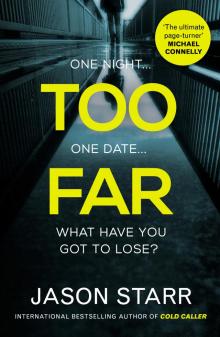 Too Far
Too Far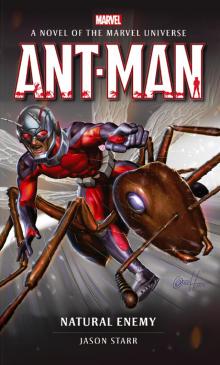 Ant-Man
Ant-Man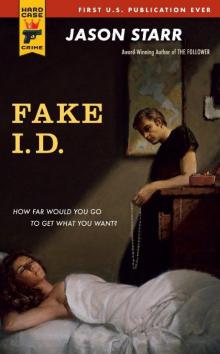 Fake I.D.
Fake I.D.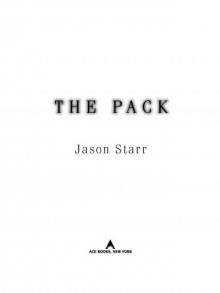 The Pack
The Pack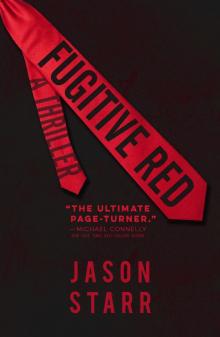 Fugitive Red
Fugitive Red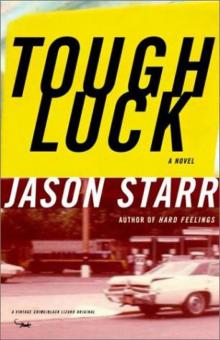 Tough Luck
Tough Luck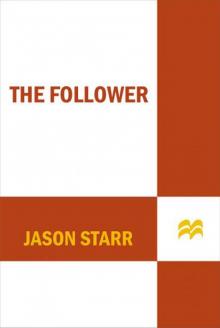 The Follower
The Follower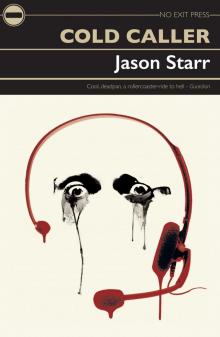 Cold Caller
Cold Caller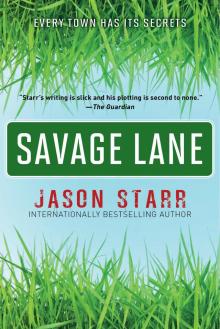 Savage Lane
Savage Lane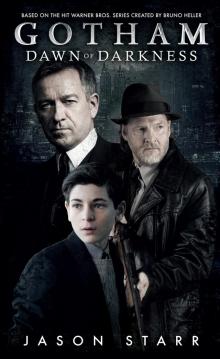 Gotham
Gotham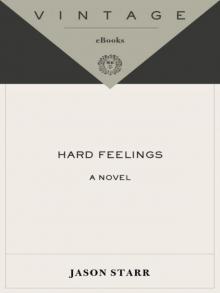 Hard Feelings: A Novel
Hard Feelings: A Novel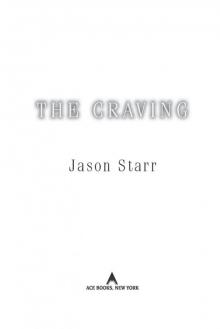 The Craving
The Craving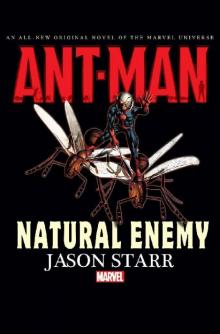 12 Ant-Man Natural Enemy
12 Ant-Man Natural Enemy Twisted City
Twisted City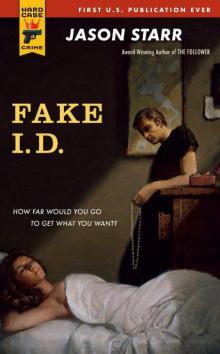 Fake I.D. hcc-56
Fake I.D. hcc-56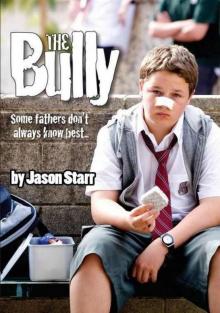 The Bully
The Bully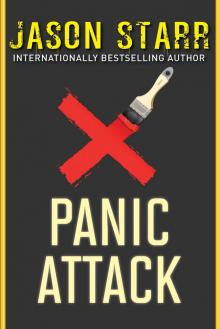 Panic Attack
Panic Attack